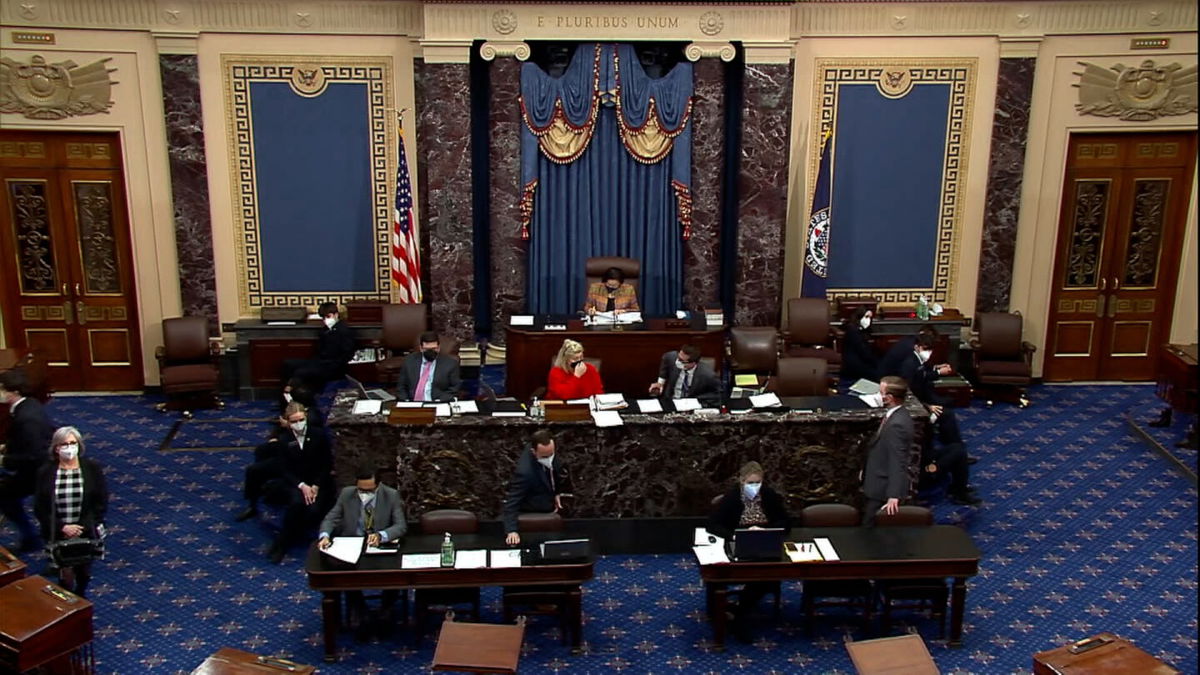What to know about the Senate’s nuclear option

By Zachary B. Wolf, CNN
As Democrats push to pass voting rights legislation through Congress, there’s been talk of using a process known as the “nuclear option.”
It’s an overheated phrase that boils down to changing Senate rules to pass legislation with a simple majority.
Senators need 60 votes to do just about anything in the Senate but change the rules. That takes only 51 votes.
Nuclear? That sounds harsh for something as simple as a rule change.
Senators view themselves as being part of the “world’s greatest deliberative body.” It’s a debatable point, but in order to protect the minority party and make sure nobody does anything without a full debate, Senate rules require that 60 of 100 senators agree to votes to move toward passing legislation. In the fancy language they speak on Capitol Hill, limiting debate and moving toward a vote is called “invoking cloture.”
Actually passing the legislation takes only 51 votes, but because of the procedural rules, it takes 60 to invoke cloture and get to the actual vote. By requiring only 51 votes to limit debate, the entire character of the chamber would change. Instead of being forced to get buy-in from the minority party — Republicans right now — the majority party would be able to pass anything for which it could get a simple majority.
The idea is that it would figuratively “blow up” the Senate. For now, a simple majority Senate excites many Democrats who want to pass more legislation. It frightens Republicans whose strategy is to grind things on Capitol Hill to a halt.
The symbolism of “going nuclear” portends a sort of mutually assured destruction in the future, to borrow another Cold War term. Democrats won’t always control the Senate. And when Republicans are in charge, you can bet they’ll return the favor.
Has this kind of rule change ever happened before?
Yes. We’re already living in a post-nuclear option world when it comes to presidential nominees.
Most judicial and executive branch nominees used to require 60 votes to invoke cloture. Democrats changed the rules to require only a simple majority to get votes on most nominees during the Obama administration. Republicans changed the rules for Supreme Court nominees during the Trump administration.
Is all of this constitutional?
Sure is. The Constitution doesn’t say anything about Senate rules. It puts that power in the hands of senators.
“Each House may determine the Rules of its Proceedings,” according to Article 1, Section 5.
Senators are tasked with signing off on nominees in Article 2, Section 2. But it doesn’t say how, exactly, which has led to a centuries-long debate on the matter.
Here’s what the Constitution says about the president’s power to appoint: “He shall have Power … with the Advice and Consent of the Senate, shall appoint Ambassadors, other public Ministers and Consuls, Judges of the Supreme Court, and all other Officers of the United States, whose Appointments are not herein otherwise provided for, and which shall be established by Law: but the Congress may by Law vest the Appointment of such inferior Officers, as they think proper, in the President alone, in the Courts of Law, or in the Heads of Departments.”
Where does the 60-vote threshold come from?
It’s in the Senate rules. Read the chapter on cloture.
But the rules have changed over time. Until 1949, for instance, according to the Congressional Research Service, senators couldn’t even move to limit debate (invoke cloture) on nominations.
According to the Senate website, Henry Clay was the first senator to threaten going nuclear on legislation, back in 1841. Up until 1975, it actually took 67 votes to overcome a filibuster.
The most famous examples came during the civil rights era, when Southerners from both parties blocked equal rights legislation. It took 60 days of filibustering to find the votes for the 1964 Civil Rights Act.
What role does actual filibustering play in all this?
Everybody seems to have a different definition of what a filibuster is. In pop culture, filibustering brings to mind Jimmy Stewart in “Mr. Smith Goes to Washington,” speaking for hours to block legislation with which he disagrees.
These days, the filibuster is an implied thing. When everybody realizes that there aren’t 60 votes to limit debate, senators don’t generally spend much time debating at all. They just move on. When a senator mounts an all-night speech, the outcome is usually preordained.
If rules are changed and it requires only a simple majority to limit debate, Republicans will still have delaying tactics to use. They simply would not be able to block most votes altogether.
Why is all this coming to a head now?
More and more Democrats support doing away with the filibuster, at least in some circumstances. Already, most major legislation — tax cuts during the Trump administration and health care during the Obama administration — required finding a way around filibuster rules. In those two cases, party leaders exploited budget rules.
But that’s an imperfect solution and would not work for voting rights, the issue over which most Democrats argue it’s worth changing rules.
RELATED: Why Democrats want to change the Senate’s filibuster rules
Democrats want to impose new national rules to protect the rights of voters as Republicans in key states scramble to limit access to mail-in voting and otherwise make it more difficult to cast a ballot.
But the consequences of going nuclear would extend beyond voting rights. You can’t go back from the nuclear option. That’s why more moderate Democrats, like Sens. Joe Manchin of West Virginia and Kyrsten Sinema of Arizona, aren’t yet on board with pushing the nuclear button.
The-CNN-Wire
™ & © 2022 Cable News Network, Inc., a WarnerMedia Company. All rights reserved.